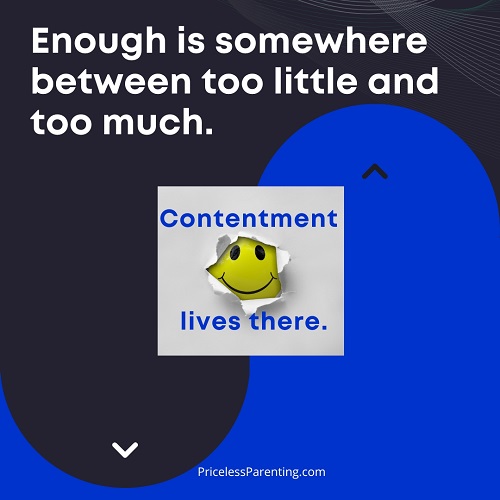Doing Too Much To Keep Kids Happy
by Kathy Slattengren, M. Ed., Priceless Parenting (sign up for monthly parenting newsletter and receive 20+ printable charts for kids and parents)

You want your kids to be happy. You know you can do things that increase the chances they’ll feel happy. You might buy them something they really want or take them on a special trip.
While that may temporarily boost their happiness, feelings are fleeting. Your child may feel happy while swimming at the pool and then feel distraught when it’s time to leave. When you need to set a limit, whether it is leaving a fun event or limiting internet access, your kids will probably not be happy.
Nobody feels happy all the time. Trying to keep your kids happy may have the opposite effect in the long run. This is especially true if you overindulge your kids to keep them happy in the moment. Whether it’s letting them eat too much junk food or stay up too late, you are exchanging short term happiness for possible long term problems.
Accepting the Full Range of Emotions
When you focus on your kids being happy, your unspoken message is that feeling happy is the goal. Emotions like anger, disappointment, frustration, sadness, loneliness and fear should be avoided.
How do you communicate this to your kids? Perhaps you can relate to the dad whose daughter expressed disappointment at having to go to the store with him. Instead of simply acknowledging her disappointment, he promised to get her some candy. She was then happy to go with him.
Maybe you’ve been in a situation like Erin’s whose son loves playing video games. When she tells him it’s time to do something else, he gets angry so she often lets him play a little longer. Even though Erin feels he is spending too much time on video games, she hates dealing with his crankiness when it’s time to turn it off.
Another mom described her son’s limited food preferences. He likes pizza, pasta and hamburgers so that’s what he has for dinner every night. While she knows this isn’t the healthiest diet, it keeps him from complaining.
When you strive to keep your kids happy, they miss out on learning to handle their more difficult emotions. You may also be sacrificing what is healthy for them in the long term for short term happiness.
Unintentionally Encouraging Self-Centered Focus
Loving parents can unintentionally raise self-centered, unhappy children. How does this happen? One way it happens is when parents continually give their children the message that the children's needs and desires are more important than anyone else's. These children grow up learning to focus on themselves, not others.
There are many sad stories of parents who bent over backwards to give their children everything they could possibly want only to have their children grow into self-centered adults. These adult children often take their parents for granted and rarely pay attention to their parents’ needs. Instead they focus on their own needs.
One mom sadly explained how her 30-year-old son had flown home for Christmas. Mom had planned a big gathering and was busy with preparations. Her son left in an angry huff before the Christmas dinner complaining that his mom wasn't spending enough time with him!
She reflected that she had always done so many things for him so that he would be happy. She didn't think of asking for his help preparing dinner and clearly he didn't think of it either. They both ended up being very unhappy that day.
Feeling Content and Thriving
It seems that children who have their basic needs met plus enjoy many extras would certainly be happy. However, kids in these situations sometimes feel despair instead of happiness. The rise in anxiety, depression and suicide among teens from wealthy families is evidence that material goods aren’t enough.
What should we wish for our kids instead of happiness? The answer to this question is discussed in Dr. Aaron Cooper and Eric Keitel's
book titled
I Just Want My Kids to Be Happy! Why You Shouldn't Say It, Why You Shouldn't Think It, What You Should Embrace Instead.
They analyze some of the negative effects of putting our kids' happiness first. They also present healthier alternatives.
The authors reviewed decades of research on happiness. They found eight key ingredients that best predict contented, thriving lives:
- Good mental and physical health
- A life of meaning
- Closeness to others
- Acts of loving kindness
- A sense of gratitude
- A sense of spirituality
- An optimistic outlook
- Gratifying pursuits
Which of these key ingredients do you think your children could benefit from further developing? Pick one to initially focus on. Work together with your child to find ways of positively expanding this area.
How does this effect your child’s sense of well-being? A sense of well-being encompasses much more than feeling happy. Ultimately building these skills will help your children live fulfilled lives.